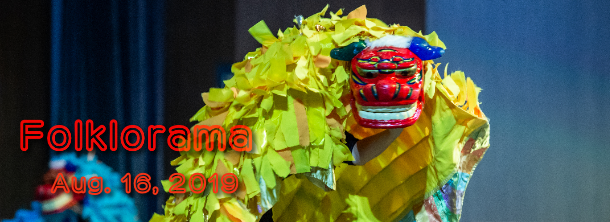Karakoro Eisa in Canada2019

We performed at the Japanese pavilion of “Folklorama”.
The first show was held in 2017, and it was the third time we performed this year.
A lot of spectators enjoyed our show, and it was a great success.
Folklorama 
In 1970, during the celebration of Manitoba’s centennial, Folk Art Council of Winnipeg organized a festival called “Folklorama” in order to celebrate the multicultural heritage in Manitoba. The festival achieved success, and it has continued 50 years since then. At each pavilion, which utilizes a school, a college or a public facility, people of each ethnic group introduces their own cultures through exhibitions, events and providing cultural food as well as exhibits their products. Manitoba Japanese Canadian Citizens’ Association hosts the Japanese Pavilion to introduce Japanese culture.
At the Japanese Pavilion, you can see various performances, such as tea ceremony, flower arrangement, the art of folding paper, Japanese traditional dance, the Manitoba Kendo Club, the Manitoba Judo Association, the Winnipeg Budo-kai Karate Club, and Taiko (Hinode Taiko). In the pavilion audience can enjoy meals, buying various foods, such as Japanese sake, beer, sushi, teriyaki chicken, fried noodle, a bowl of boiled rice covered with raw tuna, curry and rice, and manju.
This Folklorama, held in August every year, has known as one of the outstanding multi-cultural events in North America. ˙ Having a lot of visitors from around the world as well as tour buses from the United States,
they had 45 pavilions and over 445,000 people visited them in 2004.
JCAM - Japanese Cultural Association of Manitoba ![]()
In 2013 the Manitoba Japanese Canadian Citizens’ Association (MJCCA) and the Manitoba Japanese Canadian Cultural Centre (MJCCC) amalgamated to form the Japanese Cultural Association of Manitoba, Inc (JCAM). This is a non-profit, charitable organization that serves as the representative organization for Japanese Canadians in Manitoba.
JCAM is responsible for the operation and maintenance of the Manitoba Japanese Canadian Cultural Centre and will organize community, cultural and educational activities through a volunteer board and the organization’s membership. JCAM undertakes projects that include all segments of the Japanese Canadian community, as well as reach out to other Canadians. JCAM organizes activities, programs, and services in both the English and Japanese language in order to educate and inform the general community about Japanese and Japanese-Canadian art, music, culture, heritage and history, while also operating the Japanese Language School and the Japanese Public Schools Program (Japan PSP) a cultural program at the Centre for Manitoba’s elementary school students.

We performed Eisa at Canadian Museum for Human Rights.
We had a big audience, and the performance was a great success.
Our performance was broadcast on a local TV news.
To move to the website of the Winnipeg City News, click here.
https://winnipeg.citynews.ca/video/2019/08/18/karakoro-eisa-performs-in-winnipeg/
Canadian Museum for Human Rights
“The Canadian Museum for Human Rights (CHMR)” is a Canadian national museum located in Winnipeg, Manitoba, Canada. It was opened in 2014. Izzy Asper, a Jewish tax lawyer from Winnipeg, proposed the idea and vision to establish a human rights museum, and raised a donation. After Izzy’s death in 2003, his daughter Gail Asper took over his father’s wishes: “to make a place where students from across Canada could come to learn about human rights,” “to revitalize downtown Winnipeg and increase tourism to the city, as well as to raise understanding and awareness of human rights, promote respect of others and encourage reflection, dialogue and action.”
In 2007, Prime Minister announced the Government of Canada’s intention to make the CMHR into a national museum. It was completed with the contribution of a great amount of money (equivalent to about 15 billion yen) collected mainly by citizens of Winnipeg.
The exhibitions cover various human rights topics, such as the indigenous history in Canada, the history of Japanese Canadians, the killing cases and the disappearance of indigenous women, Armenian Genocide, the genocide by starvation in Ukraine (Holodomor), the apartheid in South Africa, the issue of military comfort women by the Japanese army, and so on.
In summer, 2019, we were invited to this museum to give our performance. We are really honored for us Karakoro to perform Eisa at Canadian Museum for Human Rights.



 HOME
HOME